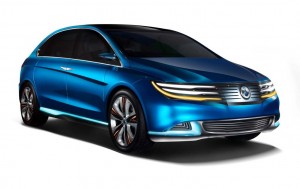
The new Daimler-BYD joint venture will launch its first battery-car concept, the Denza NEV, in Beijing.
Mercedes’ parent Daimler AG plans to launch an all-new battery-electric vehicle it has developed as part of a joint venture with China’s BYD. To be sold through the new Denza brand, it will make its debut in concept form at the upcoming Beijing Motor Show.
The show car will be called the NEV, short for New Energy Vehicle. The hatchback will use a pure battery-electric design with its batteries mounted under the floor and its electric motor driving the front wheels.
The German maker provided the basic vehicle architecture for the Denza NEV concept, along with key componentry, including the safety system. BYD, already one of the key players in the emerging Chinese battery-car market, supplied the underlying drive system.
In keeping with current Chinese trends – where many buyers prefer to have chauffeurs – Denza CEO Lian Yubo notes that, “The rear seating area was designed to feel as much as possible like a lounge area. The lounge character really comes out through the reclining rear seats integrated into the design.”
A production version of the Denza NEV is expected to reach market in China – where the car will be built – later in 2014. The first dealership selling the new brand will open its doors in Beijing in the middle of this year. Additional showrooms are set to be added in Shanghai and Shenzhen.
(Tesla launching $5 bil “gigafactory” to produce lithium batteries for future products. Click Here for the full story.)
Shenzhen BYD Daimler New Technology Co. Ltd., or BDNT, was formed in February 2011. Under Chinese law, foreign makers must find a local partner to build cars in the country – which now claims the world’s largest automotive market.
It was the first joint venture in China dedicated solely to electric propulsion and it now has over 250 engineers and experts from both companies working on future battery-based vehicles.
(Tesla Model S named Top Overall Pick for 2014 by Consumer Reports. Click Herefor more.)
Facing endemic smog problems in many of its major cities, including Beijing and Shanghai, the Chinese government has been pressing automakers to develop and launch new electric vehicles like the NEV – with government forecasts calling for putting as many as 5 million battery cars on the road over the next eight years.
“Denza represents a significant step in sustainable transportation for the Chinese automotive market. It was vital that we have the right infrastructure partner to support this innovative concept,” noted Arno Roe Ringer, BDNT’s chief operating officer.
(Honda set to kill off Insight hybrid. Click Here to find out why.)
As the world’s largest automotive market today, China could play a pivotal role in boosting market penetration of alternative drive systems, many experts believe, if the Chinese government’s push for the technology is matched by market demand. So far, however, Chinese buyers have shown a reluctance to buy alternative power vehicles. One problem is that few of the country’s motorists live in homes where they have ready access to charging technology. Price is another issue.
Daimler and BYD are also working with ABB of Sweden, one of the world’s leading power and automation technology companies, which is expected to supply fast chargers for BDNT’s battery electric Denza. But the fact that many potential buyers won’t have a place to install the home wall-mounted chargers could be a problem for the project.
What could help is the plan to set up a network of public fast chargers in China in the near future.
There are no plans to export the Denza NEV.
(Paul A. Eisenstein contributed to this report.)
